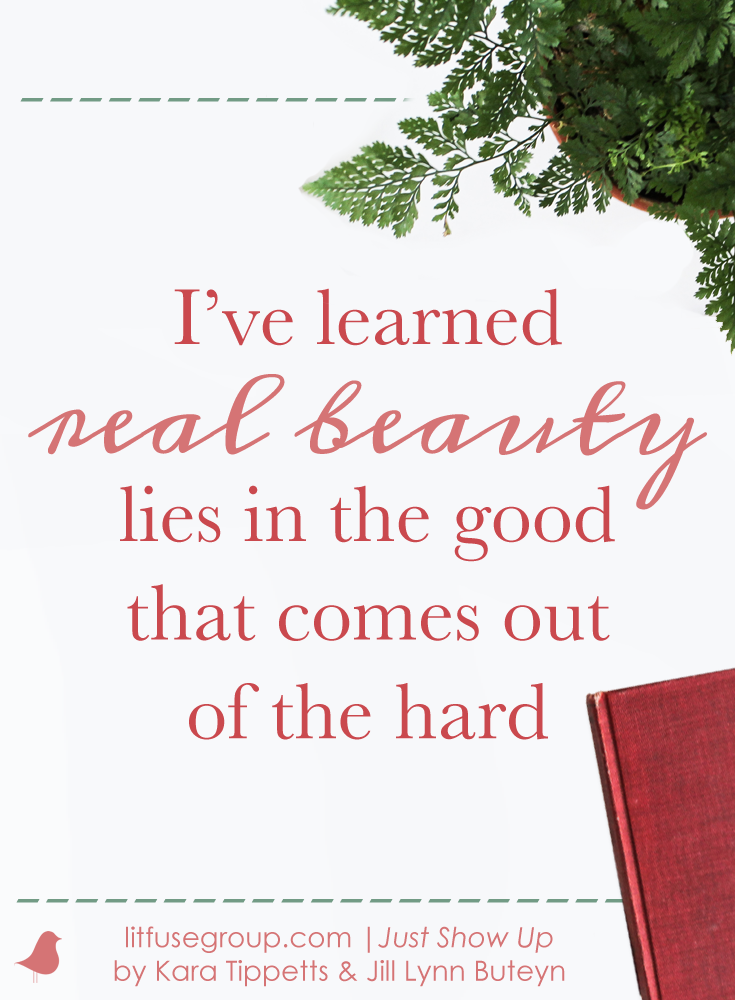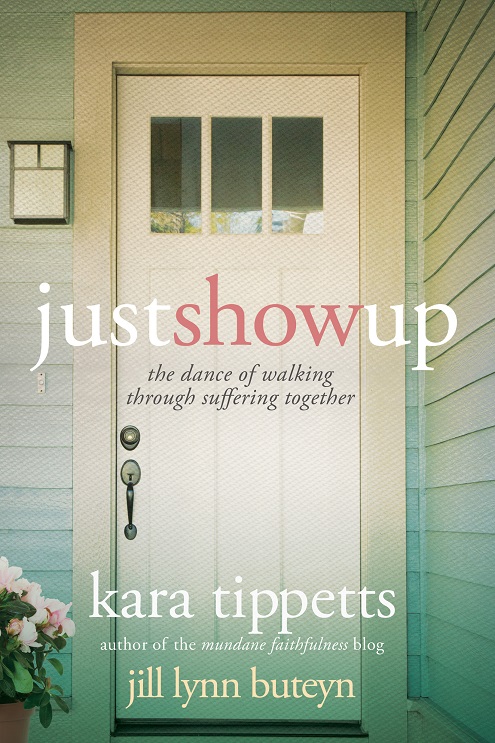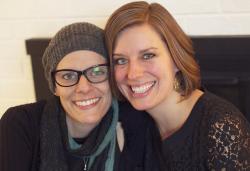Guest post By Jill Lynn Buteyn
Everyone knows someone with cancer. Or depression. Or a debilitating illness. Often we’re not sure what to do or say around people who are sick or suffering. When my friend Kara Tippetts was diagnosed with breast cancer in her mid-thirties, we hadn’t known each other for very long. I didn’t have a clue what to do or how to help her. But I decided I did want to be there for her, even if cancer left me feeling clueless.
I learned a lot from watching Kara’s community rally around her while she fought cancer, and around her family after she passed. If you’re in the place I was – that confusing moment of “how do I do this?” – here are a few guidelines for what to do when you don’t know what to do.
- Choose them. It sounds so simple, but this is the first step we can take in being there for a friend or even acquaintance who’s fighting breast cancer—move toward them. When things are hard or uncomfortable, or maybe we don’t know someone that well, stepping toward them can be scary and leave us feeling vulnerable. But you don’t have to know what you’re doing right away. Just deciding to be there for them is the biggest hurdle to cross. Don’t run away out of fear of doing or saying the wrong thing. Make the decision that you’re in, even if you don’t know exactly what that looks like.
- Keep it simple. We often complicate things. We think our gestures need to be grand or cross continents, but that isn’t the case. Sometimes it’s the cup of coffee, the hug, the text that says, “I’m thinking of you,” that makes all the difference. Yes, some people will rock at organizing the big fundraiser (and if that’s you, go for it!), but small, simple things also matter to the heart.
- Be specific. When you want to help your friend or loved one, be specific in what you offer to do. If you don’t know where to start, think about your gifts. What brings you joy and might also bless your friend during their hardship? Often that tug, that idea already fighting for attention in your mind is exactly where to begin. Instead of saying, “let me know what you need,” say “I’d like to help by doing ______. Does Tuesday work for you?” This makes it easier for a friend to accept help, and when you serve within your gifting, everyone benefits.
- Be a good listener. When our people are telling us about their hardship, it’s hard not to want to help… and fix. But most of the time, they aren’t asking for this input. Often they just need someone who’s willing to listen and let them vent about what’s going on. Try to listen without letting your mind spin regarding what you want to say next about fixing their suffering.
- Keep including them. Many times when we know our friend is sick or hurting, we assume that they don’t have the time or energy to be with friends or attend an event. This might be true—maybe they can’t fathom doing one more thing—but we can still give them the choice. Keep inviting them and don’t leave them out. At the same time, we need to be gracious if they need to say no. This is about showing them they are still loved, appreciated and noticed.
I’d love to tell you I did all of these things right as a friend surrounding Kara, but I didn’t. I made plenty of mistakes. In fact, sometimes that’s how I learned—by doing it wrong first. Hopefully these tools will give you the confidence to lean toward a friend instead of away, and to enter in to the blessing of doing community together.
Deeper Still: Do you have a story of supporting a friend, or perhaps being encouraged yourself through a hard place? Would you be willing to share one of the things you felt helped the most in the comments section? We would love to gift one of our commenters a free copy of Just Show Up: The Dance of Walking Through Suffering Together.
Jill Lynn Buteyn is the co-author of Just Show Up: the Dance of Walking Through Suffering Together, written with the late Kara Tippetts. Buteyn is also the author of Falling for Texas, an inspirational novel, and a recipient of the ACFW Genesis Award for her fiction work. Buteyn lives near the beautiful Rocky Mountains with her husband and two children.
Learn more about Jill Lynn Buteyne and Just Show Up at www.jill-lynn.com and on Facebook (JillLynnAuthor), Pinterest (JillLynnAuthor), Instagram (JillLynnAuthor) and Twitter (@JillLynnAuthor).
{Consider sharing this post with your encourager friends? XO}








When my friend’s son was in jail because of alcohol abuse, I knew there was nothing I could do to “fix” the situation. I would give her hugs at church and send her encouraging texts. I also found she appreciated it when I sent letters to her son.
My friends and family stoody by me for 4/12 years as my late husband fought his battle with cancer. During that time, he was in the hospital 30 times, most of which were emergencies.
One friend in particular, stood beside me beyond what was expected or convenient. Every time we had an emergency, I called her, no matter what time of day or night it was. She often came to the hospital to sit with me, she helped me fold clothes at home, she let me pour out my heart to her. But, no matter how hard the situation became, she always challenged me to focus on Jesus, not on my circumstances. She would remind me over and over that I was a princess in God’s kingdom and that my life was not determined by the situation, no matter how hopeless it seemed.. There were times when my friend was unable to come to the hospital. But, she always told me that she would pray for God to take care of my needs and that He would send someone to help us. And she was right, through God’s appointment times, He would send the right person at the right time.
Through this situation, I learned that the most valuable thing to do for a suffering person is to be PRESENT, no matter how inconvenient it might be. It is also important to PRAY for and with the suffering person.
Making the decision to be in, even when you don’t know what that looks like, is key. Then stick with it!! You’re either in or you’re not. But if you make the decision to be in, you’ll both be blessed by it!
My husband is a Purple Heart Marine. As a Veteran caregiver, most of my friends are also Veteran caregivers. We all rely so deeply on the encouragement from one another to keep our spirits up. This is going to be a great addition to our suggested reading list.
Just being willing to show up is huge. Being there to be a listening ear or just to be there as a presence. Cleaning house, doing laundry, making meals or watching children are all things that we can do.
I have battled chronic health issues for the past 11 years, one right after another. I can’t even begin to explain how amazing it is when people just show up to walk through this with me. It doesn’t matter how long I’ve known them, what matters is that they are there. I’m beyond blessed for all the wonderful people who’ve chosen to walk this road with me!
a needed book. done so many things wrong by trying to complicate it. I think the principles will apply to other situations as well
I think Being There is the biggest gift one can give to another. Just the Presents of another loving human being can give relief you are not alone. Silent with eye contact, hand holding, a hug passes on so much more… Listening, talking and doing can come after that.
Just being there. When my mom had cancer. I just went to all her chemos’s with her. I agree with your approach.